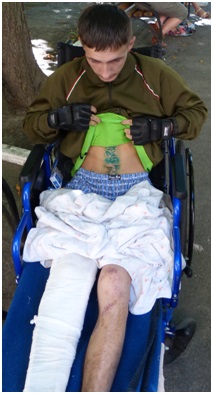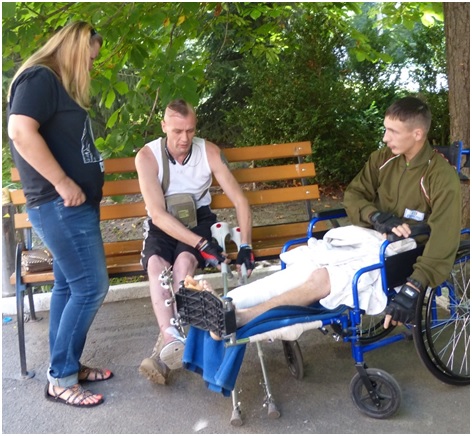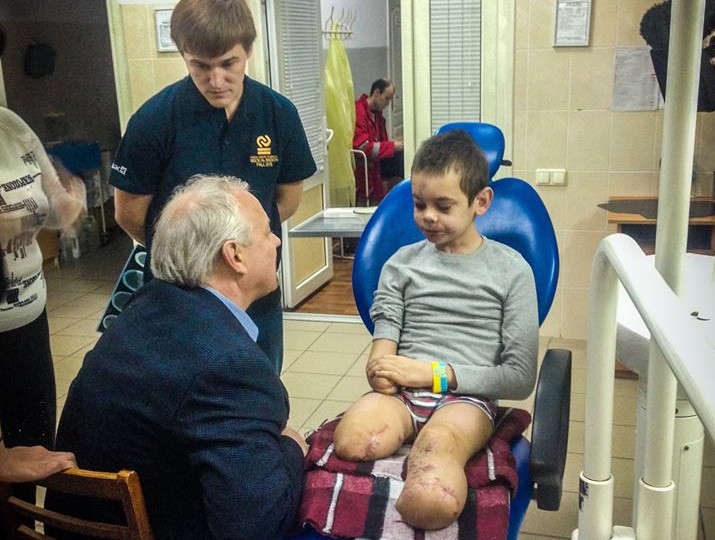Ukraine’s blessing is that thousands of self-organizing small groups and individuals have stepped forward to aid needy citizens. Its curse is that its government is doing so little, even for those who have sacrificed nearly everything defending the country.
One group doing its part is Ukraine War Amps, which was founded by “just a couple of guys” from Toronto: Gene Berezovski and John Broadhead, whose father, a Canadian Air Force veteran, was a World War II amputee.
UWA is still small: its budget was just $25,000 last year. The vast majority — $20,000 — was disbursed through the growing Adopt a Soldier program, now approaching its first anniversary.
But every little bit helps Ukraine’s wounded warriors. Berezovski, 47, and Broadhead, 57, say such soldiers can expect to receive just $100 USD per month in disability — that is, if they receive anything at all. Veterans often unable to walk are forced to travel to a provincial capital to fill out paperwork and attempt to navigate bureaucracy with a heavy Soviet legacy.
UWA already is helping about 40 such soldiers with monthly donations of $50 or more per month, often before they are able to get disability payments. A network of 120 private sponsors and eight organizations from around the world—from as far away as Israel and New Zealand—are supporting UWA so far, and 20 volunteers help with tasks such as personally delivering funds. Beneficiaries are added every month as soon as sufficient donations are found, but Berezovski and Broadhead want to help many more.
(Donors can give through crowdfunding site YouCaring.com, and UWA posts photos on its site and its Facebook page to show that 100 percent of the aid has gotten to the intended recipients, which include amputees and other severely wounded veterans. The identities and needs of the veterans are verified before aid is given.)

Dima Trompak, 23, his right leg shattered in a land-mine blast, his liver, stomach and other organs pierced by shrapnel, is in the Adopt a Soldier program. He is receiving $50 per month. Doctors worked 12 hours to save his life, and he has required four surgeries since then. But his time under the surgeon’s knife may not be done.
He has only a grandmother and a brother for family. The Mukacheve native, who is practicing for his driver’s license, still needs to travel to Uzhgorod to file his disability papers. Though he is now able to walk and did not lose a limb, he is permanently unfit for military service and unemployed. With his leg failing to heal correctly, the donations through Adopt a Soldier help him buy medicine and food.
“I have terrible pain in my legs,” Trompak said in an email through a translator. “The right leg, where the bone was punched, is not healing.
“A lot of fragments still remain,” he said. “The doctors said that some of them have to go out by themselves, and those that will remain will probably require more surgery.”
Despite it all, the slender, soft-spoken former weightlifter and kick-boxer is back in the gym, restoring lost muscle. Trompak vowed to continue defending his country if the war re-escalates.
I happened to meet Trompak at the Central Military Hospital in Kyiv in July, six months before I heard of UWA and one month after he was wounded. I was introduced to him by hospital volunteer Oksana Chebanova, 37, who also recommended him for the Adopt a Soldier program. Wealthy Kyivites, Chebanova and her husband, Max Box, work as individuals rather than part of a group. They bring food, supplies, hospital equipment and other donations to the facility and its underpaid staff. Chebanova uses Facebook to enlist help, with much coming from the diaspora in Canada and Spain.
Trompak and other wounded veterans were enjoying the sun—and, when necessary, the shade—on the grounds outside the hospital’s Spartan, low-tech trauma ward. He readily agreed to speak with me, my 16-year-old son Michael, and translator Maryna Konoval.
I heard no bitterness in his voice, just a quiet determination to tell the world about Russian aggression.
I’m a young man and I want to live in a good country, a free country. Putin doesn’t let us live the way we want to live. — Dima Trompak, Ukrainian war veteran
“People have to know what’s happening,” he said, sitting in a wheelchair and pulling from a cigarette with the bare fingertips of a gloved hand—the glove donated by Chebanova to the ward’s patients who have to deal with crutches and wheelchairs.
Splints held tight by bandages ran the length of his leg. Bone had burst through flesh when the mine exploded. Yellow crust covered the ankle and clung between toes—better, Trompak told me, than the red inflammation that had preceded it.
Suture marks laid tracks just under a big left knee—was the knee swollen or the leg atrophied? More crust on the shin. A scar reached ominously past his belly button toward his chest, with some sort of green discoloration.
Born in the Carpathians on the western fringe of Ukraine, close to Hungary and Slovakia, Trompak almost died on July 4, 2015, two hundred meters from the Russian border, near the village of Stanytsia Luhanska. Sixteen hundred kilometers from home.
He had joined the 128th Guards Mechanized Brigade out of Mukacheve a year earlier, a few months after war started in eastern Ukraine. He was an infantryman, issued an AK-74 with grenade launcher. His girlfriend dumped him when he was deployed because she was afraid he wouldn’t return, he said.
“I wanted to defend my country,” Trompak said. “I’m a young man and I want to live in a good country, a free country. Putin doesn’t let us live the way we want to live.”
Among the enemies he faced were Ukrainian separatists and Russians, he said.
“I was fighting all of them, but sometimes they fought among themselves,” he said.
“Sometimes I saw them just 50 meters away. They were either drunk or high, not thinking about death, they were just going to kill you. There were others, but they had to fight because they were pressed. They were told, ‘If you don’t fight, it will be bad for you.’”
The Ukrainian army doesn’t always equip its troops well, Trompak said.
“When a big group of people like 120 is going to the front lines, then they have everything,” he said. “But if a small group is going, they have nothing.” Trompak was traveling in a group of just 15.
Trompak told me he always will fight for Ukraine, regardless of his wounds.
“I am sure that one day the war will end, and we will win,” he said.
Berezovski and Broadhead also can be reached by email at [email protected]. The project is part of Euromaidan Press's Verified ways to help the Ukrainian army.
In addition to her hospital work, Chebanova helps the children and families of soldiers. Her Facebook profile can be found here.
To receive stories on helping Ukraine directly in your mailbox, sign up for the Friends of Ukraine weekly newsletter.





